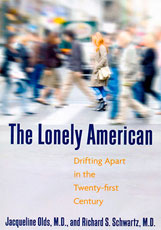"So what happened to some other classic American traits, such as friendliness, openness, charity, sharing, and neighborliness? Tocqueville described America as a country of associations. If Americans saw something that needed fixing, they formed an association to tackle the problem. Have these ever-so-American traits gone underground, or are they flourishing only in Lake Wobegon, as Garrison Keillor would like us to believe? Many of these traits have historically been nurtured by organized religious communities. As more people moved their spirituality away from institutions and toward a more private experience (the religious equivalent of having it your way), the group pressures and encouragement that nurtured these values have waned. It is impressive how much it matters when a peer group, such as the members of a congregation, compete to see who can do the most good. When competition is focused on who can eat the healthiest food or who can spend the most workout time at the gym, instead of on who can do the most good for others, much of the impetus toward charity, friendliness, and sharing is lost. (Although not all; there are important countertrends, including a dramatic rise in community service and the creation of nonprofit organizations.) . . .
"What we are left with is a persistently frantic state of busyness. Since everyone else looks frantic too, we don't see why we personally should be uncomfortable with it. Our only peeps or complaints might be to the therapists whom we have hired, because at least they will not tell anyone else about our discomfort. Our small steps back from the fray have left us in our dens of technological connectedness feeling curiously lonely. And even though we have arranged many things about our lives to be just the way we supposedly like them, our overall sense of contentment seems to be going down. Even worse, when we arrange our lives to suit our own special needs and try to have it our way, it is easy to lose the habits of sharing and taking the common good into consideration. As the sociologists who wrote the 1986 book Habits of the Heart told us, a person is subject to a malaise if he or she does nothing to contribute to the common good. Both the busyness of our lives and our efforts to escape from the busyness of our lives threaten our connections to one another. Both the busyness and the escapes discourage us from taking others into consideration. On a small scale, we as individuals may be seen as a bit selfish by our elders, who remember when giving back was the way to win the respect from friends and colleagues. On a larger scale, we as a people lose the respect of the world if we are citizens of a country that doesn't think about others while it uses up the world's nonsustainable resources.
"Both individuals and groups get set in their ways. The more isolated the individuals or groups are, the more set in their ways they become. People lose the limber agility to adapt that comes from dealing with the adjustments, conflicts, and compromise required when living with others. The end result is that each person's efforts get funneled into having things exactly his or her own way, rather than into exploring the happiness and contentment that might derive from working toward what is best for a larger group. In Collapse, Jared Diamond argues that societies that have become extinct usually had a situational or cultural blindness that led them to run themselves into the ground. If we continue in the direction we are headed, our society's epitaph might be 'They had it their way.' "
